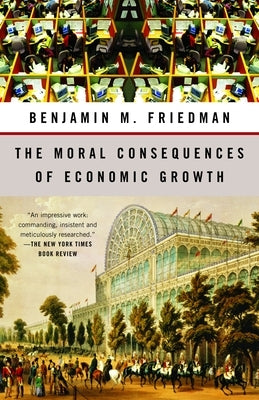Description
From the author of Day of Reckoning, the acclaimed critique of Ronald Reagan's economic policy ("Every citizen should read it," said The New York Times): a persuasive, wide-ranging argument that economic growth provides far more than material benefits.
In clear-cut prose, Benjamin M. Friedman examines the political and social histories of the large Western democracies-particularly of the United States since the Civil War-to demonstrate the fact that incomes on the rise lead to more open and democratic societies. He explains that growth, rather than simply a high standard of living, is key to effecting political and social liberalization in the third world, and shows that even the wealthiest of nations puts its democratic values at risk when income levels stand still. Merely being rich is no protection against a turn toward rigidity and intolerance when a country's citizens lose the sense that they are getting ahead. With concrete policy suggestions for pursuing growth at home and promoting worldwide economic expansion, this volume is a major contribution to the ongoing debate about the effects of economic growth and globalization.Author: Benjamin M. Friedman
Publisher: Vintage
Published: 09/12/2006
Pages: 592
Binding Type: Paperback
Weight: 1.06lbs
Size: 7.94h x 5.38w x 1.05d
ISBN13: 9781400095711
ISBN10: 1400095719
BISAC Categories:
- Business & Economics | Economics | Theory
- Business & Economics | Economics | Comparative
- Business & Economics | Business Ethics
About the Author
Benjamin M. Friedman is the William Joseph Maier Professor of Political Economy and former chairman of the department of economics at Harvard University, where he has taught since 1972. The author of several scholarly works; his first trade book, Day of Reckoning: The Consequences of American Economic Policy Under Reagan and After, was awarded the George S. Eccles Prize, awarded annually by Columbia University for excellence in writing about economics. A former investment banker, he has consulted for the Board of Governors of the Federal Reserve System and individual Federal Reserve banks. He has worked with the National Bureau of Economic Research, the National Science Foundation Subcommittee on Economics, and the Congressional Budget Office. Professor Friedman has written for the New York Times, The Wall Street Journal, and The New York Review of Books.

